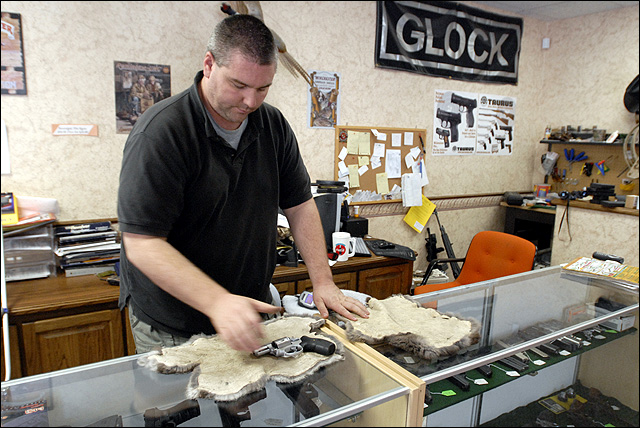Concealed gun law raises interest, worry
Topeka ? While some Kansans are eager to get a license to carry a concealed gun, many businesses are anxious to get signs to prohibit guns on their premises, officials said Thursday.
“When the law passed, we got hundreds and hundreds of calls from people asking, ‘When can I get my concealed weapon?'” said Mary Feighny, an assistant attorney general.
Kevin Graham, also an assistant attorney general, said preparing for the law “is definitely a learning and growing experience.”
The new law that will allow Kansans to get permits for concealed guns takes effect Saturday. But the first permits won’t be issued for six months, on Jan. 1, 2007.
Still, the state is preparing for what is expected to be thousands of people applying for concealed carry licenses.
On Thursday, the State Rules and Regulations Board approved temporary rules to implement the law.

Jeffery Howlett, owner of Kansas Firearms Specialties in Tonganoxie, cleans off a handgun Thursday in his store. A new law, which takes effect Saturday, prohibits weapons in businesses that post signs stating that guns aren't allowed.
Among the rules was a lesson plan for an eight-hour course on firearms safety that applicants must take to get a license. The course will include the basics of gun safety, marksmanship and maintenance, as well as the use of deadly force.
And officials said they already were getting a lot of questions from businesses about posting signs to prohibit concealed guns on their properties.
Graham said the state would have regulations on the size of the signs and where they need to be posted by September. Those regulations will be on the attorney general’s Web site at www.ksag.org, he said.
The signs will have to be roughly 8 inches by 10 inches and will probably have to be posted at any public entryway, although a final decision hasn’t been made, he said.
Under the law, Kansas residents 21 or older with no criminal background or history of mental illness or drug abuse could obtain a four-year permit after completing the eight-hour training course.
There are numerous places where people would not be allowed to carry concealed weapons, such as school buildings, law and government buildings, drinking establishments, colleges, day care centers and religious buildings.
More about concealed weapons in Kansas
- Bill signed to close records of concealed gun permits
- Sound Off: The Kansas Legislature recently passed the new concealed carry gun law? Does that mean firearms are allowed on the Kansas University campus now? (04-11-06)
- Lawrence paramedic killed in wreck (12-09-05)
- Chat with Sen. Phil Journey about concealed carry (03-30-06)
- Lawrence businesses grapple with how to handle gun law (03-24-06)
In addition, businesses and property owners could prohibit concealed weapons if they post signs.
Bob Schumm, owner of Buffalo Bob’s Smokehouse and Mass Street Deli, said because his downtown Lawrence businesses served alcohol, concealed weapons were prohibited.
But if it becomes obvious that licensees aren’t leaving their weapons outside, he said he might have to post signs prohibiting guns.
“I’m concerned about the concealed carry law in general,” Schumm said. “I just don’t believe that in a civilized society people need guns to protect themselves. There will be accidents and momentary outrages.
“It’s a bad deal and a bad day for the state of Kansas,” he said.
But Jeff Howlett, owner of Kansas Firearms Specialties in Tonganoxie, said there were numerous safeguards in the law that would prevent licenses from being issued to someone who might be unstable or dangerous.
Howlett said he hoped businesses wouldn’t prohibit concealed weapons.
The criminals will be armed, he said, and if a business has a sign prohibiting guns, “what that tells people is that this is an undefended place.”
No guns allowed
The law bans concealed guns:
¢ In any place where there’s a public nuisance, such as illegal drugs.
¢ In any law enforcement office.
¢ In prisons, jails and other detention centers.
¢ At courthouses and courtrooms, city halls and buildings, state office buildings.
¢ At polling places on Election Day.
¢ In meetings of the governing bodies of cities, counties and other political subdivisions.
¢ At the Kansas State Fair.
¢ At school- or university-sponsored athletic events not related to firearms.
¢ At professional athletic events not involving firearms.
¢ Inside elementary and secondary schools or at any university, community college or technical college facility.
¢ Any place where firearms are prohibited by federal law.
¢ At centers set up for abuse victims to handle visits to their children by noncustodial parents.
¢ In community mental health centers, mental health clinics or psychiatric hospitals.
¢ In public libraries.
¢ In child care centers or group homes for children.
¢ In places of worship.
¢ In places where property owners put up a “no guns allowed” sign.







